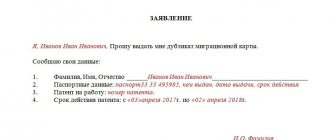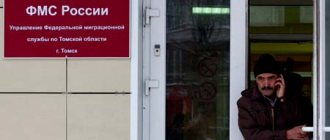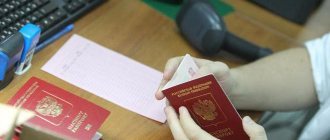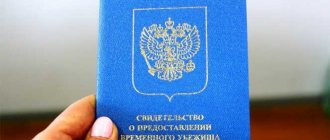Every citizen, regardless of their country of residence, has the legal right to change their place of residence and go abroad. Some do this in order to earn money, others are looking for better conditions for themselves and their families, some are forced to leave the country due to unforeseen circumstances. If a migrant poses a threat to the residents of the state in which he is located, violates current legislation or rules of stay, he may be subject to deportation. All questions regarding the rules of stay of foreign citizens are considered by employees of the Federal Migration Service, as well as the police. Some people confuse the deportation procedure with the administrative procedure for expulsion from Russia. The result is the same: the citizen is forced to leave, but the procedure for making a decision is very different. It must be remembered that only a court can make a decision on deportation, while both the police and the FMS can deport a migrant from Russia.
Possible reasons and procedure for implementation
Most often, the main reason for the deportation of foreign citizens from the Russian Federation is the latter’s violation of the rules for moving across the border, periods of stay, migration legislation, as well as failure to comply with previously made decisions by the court or representatives of the Federal Migration Service. If such facts are revealed, then government officials detain the foreigner and forcibly deport him to his country of citizenship. In some cases, a migrant may spend some time in a special detention center of the Federal Migration Service.
Based on the decision made, Article 27 of the Federal Law “On the Procedure for Exit and Entry into the Russian Federation” comes into force, according to which a foreign citizen is prohibited from entering the territory of Russia for a period of 5 years.
It must be taken into account that in legal practice there are a huge number of situations where the decision on deportation was made erroneously or even illegally. There are cases of violation of the current legislation by representatives of the Federal Migration Service and other government bodies, so the abolition of deportation from Russia is a reality. If the case is successfully completed, the five-year ban on entry into the country is also lifted, so if there are legal grounds for challenging the decision, you should not hesitate, but immediately proceed to the appeal procedure.
Deportation or deportation?
We receive many questions related to deportation and we have noticed that most foreign citizens, when asking a question, use the word “deport” instead of the word “deportation” and ask the questions “How to check deportation?”, “How to find out deportation?”, “Checking deportation”, “FMS Russia deportation”, “How can deportation be lifted?” and many others. We would like to draw your attention to the fact that the use of the word “deport” is not entirely correct and when communicating, in order for everyone to understand what we are talking about and to avoid confusion, we recommend using the word DEPORTATION.
In general, these two words mean the same thing and imply the forced expulsion of a foreigner from the country in which he was located.
Do you want to be the first to know news and information for migrants and always be aware of what is happening? Subscribe to our VKontakte group!
Many have heard this terrible word - deportation. But there is no clear understanding of what it is and how it happens. However, according to the Federal Migration Service, 2021 may not be very favorable for 200,000 foreigners. The deportation of foreigners outside the country is not a rare phenomenon. This method is the most effective in the fight against illegal visitors.
Deportation usually occurs forcibly, and either one person or a group of people can be deported. There are plenty of reasons for this, but the most common is violation of the regime of stay in the country and non-compliance with migration rules.
One should immediately distinguish between deportation and expulsion. The first concept implies forced departure from the country, and the second independent leaving the Russian Federation.
Some differences between deportation and removal:
- the decision on deportation is made within five days, on expulsion - as soon as the document comes into force;
- an application to appeal against deportation is considered for 3 months, and for deportation - 10 days;
- expulsion is a measure of punishment, and deportation is a measure of influence by the state;
- the person is deported by the court and expelled by the FMS.
Read more: Date of accrual of property tax for individuals
The decision of the migration service employees is made in accordance with the Law on the Stay of Foreign Citizens in the Russian Federation, which explains that deportation is nothing more than the expulsion of a foreign person to another country.

Moreover, it can be voluntary or forced, accompanied by a convoy outside the country, which is very humiliating.
It should be understood that if a person is a citizen, then they do not have the right to deport him, even if he is the most notorious criminal. This is stipulated by the human rights convention.
Today, deportation is an administrative punishment.
What is cancellation of deportation and who has the right to it?
From a legal point of view, the cancellation of deportation from the Russian Federation is the removal of measures for forced eviction from the country from migrants who do not have Russian citizenship. The current regulations provide for a number of exceptions for certain categories of citizens who cannot be deported:
- Foreign citizens who have been granted political asylum;
- Refugees who, due to natural disasters or hostilities, are temporarily unable to return to their country;
- Foreign citizens studying full-time in Russian educational institutions;
- Migrants who have close relatives with Russian citizenship living in Russia;
- Persons married to citizens of the Russian Federation;
- Foreign citizens who cannot leave the country for health reasons.
What are the procedures for appealing deportation?
If foreign citizens fall into one of the categories listed above or have other legal grounds for staying in Russia, they can file a claim to appeal their deportation. It is recommended to obtain a preliminary consultation from a migration lawyer, because independent actions can only aggravate the situation, and some tricks can also lead to criminal liability.
In general, the abolition of deportation from Russia is carried out in three stages:
- Obtaining a written copy of the decision on deportation from the migration service department;
- Drawing up a justified complaint against the decision and sending it to the court;
- Receiving a response from the authorized body.
It is important to take into account that after some changes in the procedural legislation of the Russian Federation came into force, citizens no longer have the right to independently defend themselves in court. An exception is made only for persons who have a legal education received at one of the higher educational institutions of Russia.
How does deportation happen?
The deportation process itself is carried out as follows:
- A citizen of Uzbekistan ends his period of legal stay in the Russian Federation, or another reason arises for leaving the country.
- The head of the Department of Internal Affairs of the Ministry of Internal Affairs draws up the corresponding deportation order and takes from him a written obligation to leave Russia in a timely manner. If this does not happen and the deadlines are not met, the migrant is placed in a specialized institution and is expelled by a court decision.
Note! Deportation is carried out only if the foreign person has not committed an administrative offense or a criminal offense. If we are talking about guilty actions, expulsion is used instead of deportation.
What is the difference between expulsion and deportation?
Deportation is an administrative punishment in the same way as administrative expulsion and many foreign citizens, having little understanding of the legal names, confuse these two terms. Let's understand a little about these two definitions and make it clear so that you understand the difference between them.
Deportation implies that after a court decision to deport a foreign citizen, he will be expelled from the borders of the Russian Federation, accompanied by a special convoy (es) that will accompany the migrant until he leaves the borders of Russia.
The convoy is needed so that the state is confident that after such a decision is made, the migrant will definitely leave the territory of the Russian Federation.
Watch a video about how foreign citizens are deported from Russia.
The decision on administrative expulsion is also made in court and differs from deportation in that the foreign citizen is given a decree stating that the court has made a decision on his deportation from the Russian Federation and he must leave Russia within a certain time, usually in within 20 days from the date of receipt of a copy of the decision. In this case, the migrant must independently control the process of his administrative deportation and in case of failure to comply with this resolution, more stringent measures will be taken against him, including detention and placement in a special detention center with subsequent deportation.
How to cancel deportation from Russia
If a foreign citizen has already been deported or a decision on deportation was made in court, but he is still on the territory of the Russian Federation, then in some cases there are chances to successfully lift the deportation and avoid deportation from Russia.
Deportation can be lifted in the following cases:
- you have relatives who have Russian Federation citizenship and live in Russia.
- Your husband/wife is a citizen of the Russian Federation.
- your child is a citizen of the Russian Federation.
- at the time when the court made the decision on deportation, you had a work patent, work permit, residence permit or temporary residence permit issued and valid.
- you are a student at a university, institute or university.
- you are sick and undergoing treatment in a medical facility in Russia.
If you belong to the category of foreign citizens listed above, then you have every chance to cancel the deportation and stay in Russia. You should not count on the fact that in this case the decision to deport you from Russia will be annulled! All of the above cases can only be grounds for canceling such a decision upon appeal in court.
In any case, this process is complex and long, and if you do not have a legal education, then most likely you will not be able to achieve anything alone and you will waste your precious time and money.
In such cases, we recommend that you contact experienced migration lawyers who deal with such cases and have experience in lifting deportation from migrants.
Sometimes it takes a lot of time to get a decision to cancel deportation, but considering that you still have the opportunity to stay in Russia and work, it’s worth it!
Pitfalls and tricks
You can find some tips online on how to avoid forced deportation. Practice shows that such actions can only aggravate the situation, so the following methods should not be resorted to in any cases:
- Marriage with a citizen of the Russian Federation after the decision on deportation has been made by the court or the Federal Migration Service. A legal marriage can be a reason for cancellation, but there is no retroactive effect - it must be registered in advance.
- Change of surname in your country. Sometimes foreign citizens expelled from Russia return home, change their surname there and try to re-enter the territory of the Russian Federation under the current five-year ban. The measure is useless because states exchange such information immediately, and under Russian law such a trick can be regarded as a criminal offense.
- Falsifying documents or registering a marriage retroactively is another dead end. The foreigner will not only be forcibly deported from the country, but also a criminal case will be opened with the corresponding consequences.
Deportation of foreign citizens from Russia
Notifying the foreign national of the results of the case under consideration, workers issue him a duplicate of the deportation decision. The process is carried out by the federal executive body responsible for migration and the body responsible for resolving internal affairs issues. The process of forced placement of a foreigner or apartrid outside Russia is used regarding violators if:
- the visa or other permit was canceled, but the migrant continues to stay in the state;
- the permissible period of stay of a foreigner in the Russian Federation has expired, but he did not leave the Federation for 3 days;
- a foreigner entered the state illegally (using falsified papers).
Read more: How an apartment purchase and sale transaction is carried out
Foreigners who comply with all immigration laws do not face deportation.
Nuances and terms of appeal
It is important that all the requirements of a foreign citizen described in the statement of claim are based only on procedural legislation. First of all, it is important to get the decision suspended. If such a request is granted, then the foreigner receives the legal right to stay in the country until the appeal is considered. If the judicial authority recognizes the decision on deportation as illegal, then, according to the resolution, the migration authorities must review the previously taken measures and lift the imposed ban on entry into the Russian Federation.
If deportation was imposed on a foreign citizen by decision of the court of first instance, then the appeal must indicate:
- Name of the authority;
- Personal information about the applicant;
- The decision of the court of first instance;
- The requirements of the deported person are stated as fully and clearly as possible;
- Current documents confirming the right of a foreign citizen to remain on the territory of the Russian Federation.
In some cases, filing a complaint also requires paying a state fee. Check the amount with the court to which the appeal is being filed.
As for the timing and jurisdiction of the issue, the appeal must be filed no later than 30 days after receiving the decision and only through the court that made the initial decision. If the last possible day to file a complaint falls on a weekend, the consideration will be postponed to the next business day. Documents can be provided in person or sent by mail with a list of attachments. The third option is to issue a power of attorney to a migration lawyer, who will independently deal with the interaction with the authorized bodies.
Prerequisites for deportation
The main reasons for deportation from Russia are illegality. Illegal people do not pay taxes to the country, which has a negative impact on the economy and take up jobs in large numbers. If such a person is unable to pay for deportation, the money is spent from the state treasury.
You can anonymously report illegal immigrants to the migration service and it will take appropriate preventive measures.
Persons subject to deportation from Russia
The Law states that foreigners are subject to deportation:
- without a registration card in hand;
- who violated the Law of the Russian Federation and committed a crime. Moreover, in case of a serious offense, a foreign person may be placed in prison with subsequent deportation from the country;
- non-compliance with the rules of staying in the country;
- illegal immigrants;
- people with canceled documents
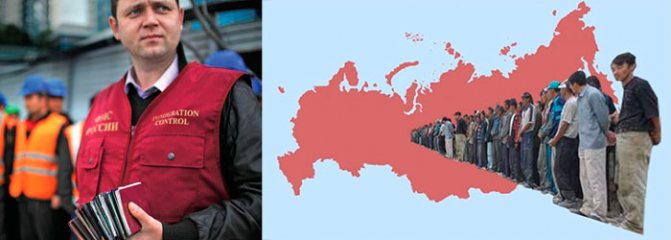
ntami; - those who get a job without permits, and the employer can also be punished if they provide a workplace;
- using fake documents to obtain the right of residence.
Moreover, a foreign person must leave Russia within 72 hours in the case of shortened periods and within 5 days in case of cancellation of the residence permit.
What will happen to a stateless person?
The law explains that this person does not have citizenship, and therefore it is impossible to determine which state he belongs to. As a rule, such a person can be deported due to a violation of the law or simply being undesirable in the country.
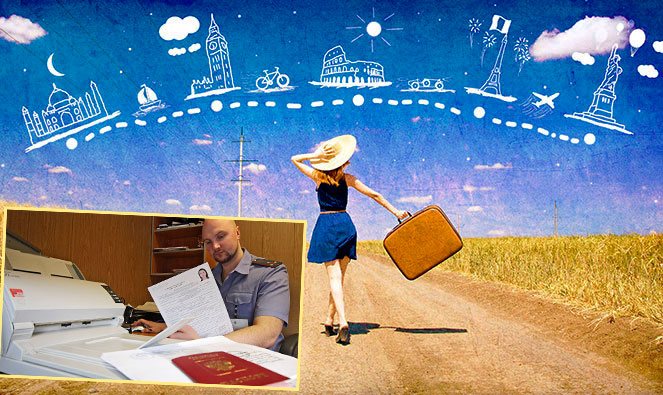
Of course, such a decision is not always legal and, if a stateless person knows about persecution by the state, he can appeal the deportation decision in court or administratively.
The following persons cannot be expelled from the country:
- refugees;
- graduates;
- foreign citizens of countries where hostilities are taking place;
- those who have asked for political asylum;
- who have applied for refugee status.
Court decisions
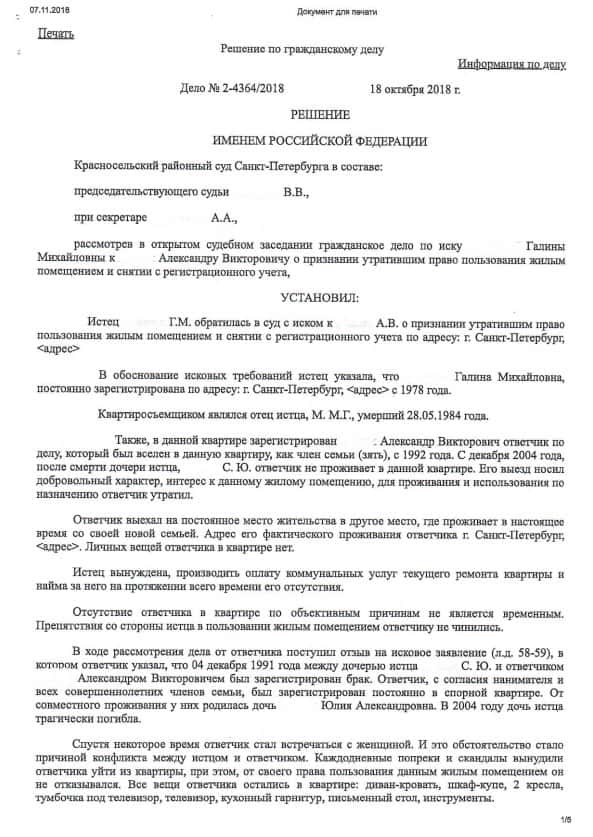
Lawsuit regarding communication with a child.
The case of the defective fur coat
The term was reduced by 6 times: defense of the accused under Article 228.1 of the Criminal Code of the Russian Federation
The culprit of the accident fled the scene
How to return an illegally sold apartment
Customer Reviews
Gratitude to Vasily Anatolyevich Dear Lyubov Vladimirovna.
I would like to express my gratitude to Vasily Anatolyevich for his competent legal assistance in solving my difficult case. I wish you and your company further prosperity and success in your hard work.
From the bottom of my heart and with best wishes. 05/03/2018
Gratitude from Evgeniy N. I express my gratitude to Alexander Viktorovich Pavlyuchenko for the qualified management of my case, competent advice and informed decisions, which led to compensation for all claimed losses.
Sincerely, Evgeniy N., November 17, 2017
Gratitude from Piskunov I.B. I just don’t have words to express my gratitude to Sergei Vyacheslavovich. Thank you for having such a lawyer. Thank you for your help regarding the issue regarding the employment contract.
Piskunov I.B. 12/12/2018
Gratitude from Busygin A.I. I express my gratitude to Vasily Anatolyevich Kavalyauskas for the qualified management of my case, competent advice and justification for the decision, which led to compensation of the stated claims.
Sincerely, Busygin Alexander Ivanovich
26.12.2017
Gratitude from Remedova A.G. I express my gratitude to the Legal Agency of St. Petersburg, namely Denis Yuryevich Stepanov, for the assistance provided in resolving my issue, and I also express my gratitude to the entire team of the consumer rights protection society for their responsiveness and pleasant communication.
Remedova A.G. 08/17/2018
Gratitude from Antonov Arkady I, Antonov Arkady Shanobich, turned to the Legal Agency of St. Petersburg for help due to the fact that when concluding an agreement for spinal treatment with Medstar, I was actually deceived in the cost of treatment and more. During the process of drawing up a treatment contract with me, no one explained to me that the treatment would be carried out using credit funds; the amount of treatment was constantly changing. My requests to be given longer time to familiarize myself with the procedures and consultations at their price list were refused. That is, there was actually pressure on the client. At home, when I carefully read the entire document, I realized that I had actually been deceived about money and treatment time. On October 30, 2018, I applied for legal assistance from the Legal Agency of St. Petersburg regarding the termination of the contract for treatment at Medstar and the termination of the loan agreement from Alfa-Bank. My case was handled by Denis Yurievich Stepanov, all issues were resolved very quickly and I was informed about all situations. I would like to thank Stepanov D.Yu. and all lawyers who work in this agency.
November 21, 2021
Review by G.N. Antropova To the lawyer of the Legal Agency of St. Petersburg A.V. Ermakov
I express my gratitude to you for your professionalism in protecting my interests in a criminal case, Andrey Valerievich, allow me to express my gratitude to you for your help and support. I note your high professionalism and skillful actions in defending my positions.
Best regards, G.N. Antropov
Gratitude from gr. Moskovchuk V.G. I express my deep gratitude to lawyer Denis Yuryevich for the consultation and bringing the case to its logical conclusion. Legal documents were drawn up very competently and sent to court. The case is won. Hooray!!! Thank you very much!
Plaintiff: Moskovchuk V. G.
Gratitude from Truk N.N. I would like to express my gratitude to Vasily Anatolyevich Kavalyauskus, Alexander Viktorovich Pavlyuchenko and Maxim Andreevich Lobur for providing qualified legal assistance, with the help of which my problem was resolved quickly and clearly. When contacted, I always found understanding and attention. It’s good that the “Society for the Protection of Consumer Rights” employs such lawyers and advocates. I wish you success in your future work and defending the interests of consumers.
Sincerely, Truk N.N.
07.05.2018
Gratitude from gr. Voronova T.A. I express my gratitude to Yuri Vladimirovich for competent, highly professional advice on the issue of “Protection of Consumer Rights”, a clear explanation of my further actions in my situation, as well as gratitude to Olga Anatolyevna for her attentive and sensitive attitude towards visitors. I was glad to meet your agency!
Voronova Tatyana Anatolyevna
tel.
